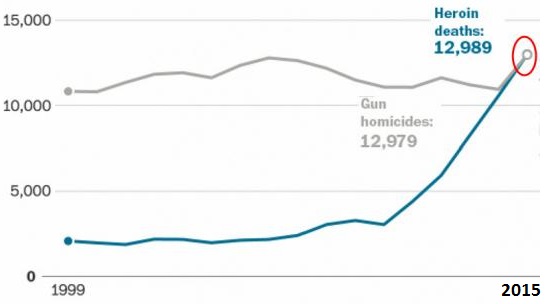Solutions abound, but they aren't one size fits all ideologies.
It isn't just coincidental that ideology shares so many dynamics with addiction. Though ideology is a faith-belief dynamic rather than a chemical process, both require constant reinforcement/renewal and both demand a painful withdrawal procedure of those who decide to free themselves of the monkey on their back.
The individual addicted to an ideology needs a constant drip of confirmation that the ideological belief is both correct and ethically superior to competing belief systems. The ideology-addict gets a much-needed hit of confirmation by reading, watching or listening to other believers' justifications and defenses of the ideology.
Ideology fills two basic human needs: certainty and purpose. a constant state of uncertainty places a corrosive burden on the mind, emotions and spirit; the solution is a decision or resolution that resolves the uncertainy.
Humans need purpose to guide their life; aimlessness is debilitating and unnatural.
Addiction provides purpose, as the life of the addict is guided by the need to satisfy the addiction.
Ideology also provides purpose: the believer is called upon to defend and evangelize the ideology as an abstraction, and support its manifestations in the real world.
Addiction is an all-or-nothing state of being. If an individual can abandon the addiction at will and feel no deprivation, it isn't an addiction; if sporadic half-measures suffice, it isn't an addiction.
Ideology is also an all-or-nothing state of being. One doesn't believe in capitalism or socialism, for example, in half-measure or occasionally when the whim strikes; one is convinced of the rightness of one's ideology as a permanent state of certainty.
There is a sense of belonging and betrayal implicit in ideological beliefs that mirrors addiction. The sex addict, for example, feels only fellow sex addicts can possibly understand the compulsion and satisfaction of that particular monkey on one's back.
In the state of ideological certainty/ addiction, only fellow believers can possibly grasp the perfection and rightness of the ideology. Thus this certainty is not just a state of being; it is also a state of belonging, hence the similarity of belonging to a cult and addiction.
To cease believing is heresy and an abject betrayal of the brethen/sisterhood.Hell hath no fury like a membership scorned or abandoned.
True believers feel a certain kinship not just with fellow adherents but with adherents of opposing camps. Ardent socialists dismiss the ideology of true believers in capitalism (and vice versa), but understand the ardency of the misled: their belief is misplaced, but not their ardency.
There is always hope that the misled might see the light and switch allegiance to the "right" ideology.
The unbeliever is however suspect. How could someone believe in only some aspects of socialism and discern falsehoods in the rest? (The same being said of those who only see the value in narrow strips of capitalism.)
Ideological purity mirrors the dangers of addiction. To the true believer of free-market capitalism (i.e. the abstraction, not the real-world version), public ownership of waterworks (for example) is anathema, even if example after example proves the disastrous consequences of the sale of public water utilities to distant tax-evasion based corporations.
Just as the addict has no interest in other forms of addiction (the sex addict has little interest in heroin, etc.), those addicted to an ideology have little interest in anything that muddies the water of their chosen certainty: if private or private ownership is anathema, it is always and forever anathema.
Why is this so? Certainty quickly erodes when complexity is introduced. What do we make of worker-owned enterprises? Since they are not publicly owned, they're not socialism; nor are they cleanly capitalistic, since the capital of ownership cannot be traded on the open market--yet the worker-owners must still operate the enterprise at a profit lest it fail.
This is why it's difficult for true believers to deal with the ambiguity of complexity. If we say (as a rough estimate) that Marx was 50% right--profoundly right about the half he nailed (the alienation of the worker from the product of his/her labor, for example) and profoundly wrong about the half he botched (the state fading away, etc.)--this doesn't sit well with believers, just as capitalism's failures don't sit well with its true believers.
This is why ideological purity is a dangerous addiction: the world is an inherently messy, dynamic environment and the ease of all-or-nothing certainty leads to catastrophic failure when all-or-nothing purity is imposed on a world that is complex rather than simplistic.
All-or-nothing demands of ideological purity inevitably lead to totalitarianism.Unbelievers and dissenters introduce a disturbing lack of certainty, and pose the risk of organizing life around other beliefs. The solution is to forcibly convert them or force them to live in a world in which ideological conformity is imposed on all.
As history amply proves, unfortunately, all totalitarian systems result in destabilizing inequalities, as some are inevitably more equal than others. Just as opioid deaths spiral higher as the monkeys of addiction proliferate, the death of complexity and uncertainty lead to death of culture, opportunity and eventually of social stability and the common good.
NOTE: Contributions/subscriptions are acknowledged in the order received. Your name and email remain confidential and will not be given to any other individual, company or agency.
Thank you, Eugene J. ($5/month), for your splendidly generous pledge to this site -- I am greatly honored by your support and readership.
| |
Thank you, Juan V. ($5/month), for your superbly generous pledge to this site -- I am greatly honored by your support and readership.
|




























